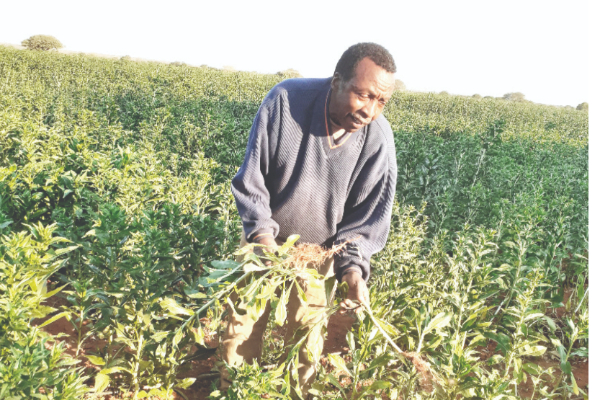Kenyan with miracle crop in Botswana
By People.Reporter, October 24, 2022Long before the price of cooking oil became the most important topic in kitchens and social media, a Kenyan researcher in Botswana was seeking a solution to a problem he had foreseen.
Approximately 30km north of capital Gaborone, Dr Nelson Kiama Mwaniki is enjoying the green scenery of a Boriteng farm. Not a drop of rain has fallen for over six months in this semi-arid nation in the southern part of Africa.
But you can’t miss the two-hectare green vegetation that looks like an oasis in a desert, with bees dancing and foraging over the blossoms.
Dr Kiama, an alumni of Starehe Boys Centre and University of Nairobi, has for more than 20 years been researching on the safflower, a viable cash crop. It is in this farm that this writer found him.
What is safflower (carthamus tinctorius)
It is a close cousin of sunflower, and has been grown and used for hundreds of years by the Chinese in traditional medicine and as cooking oil. Other uses include making dyes, food spices and animal fodder. When young, it is a highly nutritious vegetable.
You have spent over 10 years researching on this wonder crop?
Actually, over 20 years, and not just studying safflower but other plants with medicinal and economic benefits — especially for food and medicine. Plants that can alleviate poverty.
Safflower has been farmed elsewhere. Where do you come in as a researcher?
The world’s biggest safflower growers are China, India, Canada, Australia, USA, and many Middle East countries. Ethiopia is the only significant safflower grower in Africa. In 2002, safflower was documented in a World Health Organisation study, ‘Monograph of Medicinal Plants’, as one of the most researched medicinal plants.
At the time, Mahidol University in Thailand was conducting clinical trials on safflower in Human Immunodeficiency Virus (HIV) Triple Therapy.
I reached out to Washington State University (USA) for a donation of safflower seeds for research, and they gave me seeds from almost all safflower growing countries. My research strategy was to cross-breed the plants to get seeds suitable to Botswana soils, climatic conditions, and farming practices.
That took me eight years. I then developed the safflower Kiama variety which grows all year round, is resistant to diseases, has beautiful flowers minus prickly spines, and is not destroyed by livestock.
In 2009, after presenting my on-farm safflower research findings to Botswana conferences, a follow-up presentation to the Ministry of Agriculture departmental heads was facilitated. During that presentation, the Botswana University of Agriculture and Natural Resources was tasked to carry out their own research to corroborate our findings.
To date, the university has done extensive research on safflower.
I developed the first safflower seed variety (safflower Kiama variety or composite) which is still being used as a control seed variety.
What are the benefits of safflower?
The Botswana farmer is looking for a high-value crop which can grow all year round . A crop with high tolerance to heat and cold and with no need for irrigation. A crop which cannot be destroyed by baboons, cows and goats.
A crop which cannot be stolen when the farmer is away. A crop which is easy to sell. Safflower is that crop.
It is both food and medicine. As cooking oil, it has more health benefits than many other oils, including olive oil. As a herbal tea, it helps control blood pressure, blood sugar, cholesterol and reproductive disorders. Also, it helps prevent blood clots.
What nutrients does it have?
Safflower is rich in micro-nutrients that enable our bodies to utilize the food we eat. Safflower fodder is higher in proteins and minerals than other crops like lucerne, fenugreek, alfalfa, lablab and most grasses. It is a wonder crop.
What future do you foresee for safflower farming in Botswana?
It has taken over 10 years to realise the potential of safflower as a cash crop. In 2019, I hosted a field day for South East District Farmers Association.
And last year, I displayed safflower products at Ramotswa Agricultural Week. Indeed, safflower is no longer unknown to many people. Once a critical number of farmers pocket money from safflower, its fame will spread like a bush fire.
What favourable factors should Botswana take advantage of to maximise the gains of safflower as a cash crop?
The country’s national vision, policies, laws, structures and programmes are perfectly lined up to support safflower growing. But these favourable factors will not be of much use if the government does not act expeditiously.
Currently, there is no major exporter of safflower oil. All the major safflower producing countries do not produce enough for their own needs. Botswana could, with its vast land mass, take advantage of this supply gap.
What changes in the current agriculture policies would you wish to see?
There is no need for any change. Look at the Rural Development Policy, for instance. The government is committed to support agricultural initiatives, including easing regulations to allow entry of new crops.
What inspires you?
I am inspired by doctors like David Livingstone, Shepherd, Merriweather, and Howard Moffat who feature prominently in Botswana’s history. They left the comfort of their countries to assist other people.
Like these foreigners and Christians, I am responding to a God-given assignment to improve public health.
I am also a student of Dr Robert John Haylock Chambers. His book, “Putting the last first” is a must-read.
Lastly, I am inspired by plants dancing in the wind.
What would you want to be remembered for?
Most people know me as a farmer, doctor or priest. I would wish to put safflower in the country’s national cropping plan. I named this safflower variety Kiama, which is my real name. Kiama means a miracle in my Kikuyu language.
